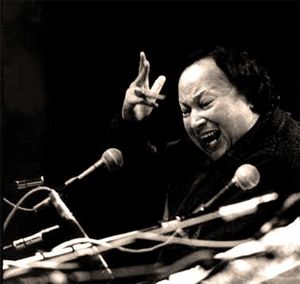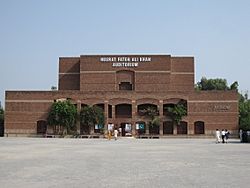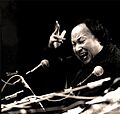Nusrat Fateh Ali Khan facts for kids
Quick facts for kids
Ustad
Nusrat Fateh Ali Khan
PP
|
|
|---|---|
| NFAK | |

Nusrat performing at the Royal Albert Hall
|
|
| Born |
Pervez Fateh Ali Khan
13 October 1948 |
| Died | 16 August 1997 (aged 48) |
| Burial place | Jhang Road Graveyard, Faisalabad, Punjab, Pakistan |
| Other names | Shahenshah-e-Qawwali King of Kings of Qawwali |
| Occupation |
|
| Spouse(s) |
Naheed Nusrat
(m. 1979) |
| Children | 1 |
| Parent(s) |
|
| Relatives |
|
| Musical career | |
| Genres |
|
| Instruments | |
| Years active | 1964 – 1997 |
| Labels |
|
| Associated acts |
|
Ustad Nusrat Fateh Ali Khan (born Pervez Fateh Ali Khan; October 13, 1948 – August 16, 1997) was a famous Pakistani singer, songwriter, and music director. He was best known for singing qawwali, which is a type of Sufi devotional music. People often called him "Shahenshah-e-Qawwali," meaning "King of Kings of Qawwali."
Many experts, like The New York Times, thought he was the greatest qawwali singer of his time. LA Weekly even called him the fourth greatest singer ever in 2016. Nusrat Fateh Ali Khan was amazing at singing with great power for many hours. He is famous for making qawwali music popular all over the world.
He was born in Lyallpur (Faisalabad), Pakistan. Nusrat Fateh Ali Khan first performed in public when he was 15 years old. In 1971, he became the leader of his family's qawwali group. He added his own special style of singing, using techniques like sargam and khayal. In the early 1980s, he signed with Oriental Star Agencies in England.
Khan released many albums and movie songs in places like Europe, India, Japan, Pakistan, and the U.S. He worked with many Western artists and became a well-known world music artist. He traveled and performed in over 40 countries. Besides making qawwali music famous, he also had a big impact on modern South Asian pop music, including Pakistani pop, Indian pop, and Bollywood music.
Contents
Who Was Nusrat Fateh Ali Khan?
Early Life and Musical Journey
Nusrat Fateh Ali Khan was born in 1948 in Lyallpur (now Faisalabad), Punjab, Pakistan. His family came from a place called Basti Sheikh Darvesh, which is now in India. His ancestors had been musicians for almost 600 years.
Nusrat was the fifth child and first son of Fateh Ali Khan. His father was a music expert, singer, and instrument player. At first, his father didn't want Nusrat to become a qawwali singer. He hoped Nusrat would choose a different job, like a doctor or engineer. This was because qawwali artists sometimes had a lower social status.
However, Nusrat showed a strong talent and love for qawwali music. So, his father eventually agreed to let him follow his passion.
Becoming a Qawwali Leader
In 1971, Nusrat's uncle, Mubarak Ali Khan, passed away. After this, Nusrat became the official leader of his family's qawwali group. The group then became known as Nusrat Fateh Ali Khan, Mujahid Mubarak Ali Khan & Party.
His first public performance as the group leader was for a radio show called Jashn-e-Baharan. Nusrat mainly sang in Urdu and Punjabi. Sometimes, he also sang in Persian, Braj Bhasha, and Hindi. His first big hit in Pakistan was a song called Haq Ali Ali. This song was sung in a traditional style with traditional instruments.
Global Recognition and Collaborations
In 1985, Nusrat Fateh Ali Khan performed at the World of Music, Arts and Dance (WOMAD) festival in London. He also performed in Paris in 1985 and 1988. He visited Japan for the first time in 1987. In 1989, he performed in New York, which made American audiences admire him.
Throughout his career, Khan worked well with many South Asian singers. These included Alam Lohar, Noor Jehan, A. R. Rahman, Asha Bhosle, Javed Akhtar, and Lata Mangeshkar.
In 1988, Khan worked with Peter Gabriel on the music for the movie The Last Temptation of Christ. This led to Khan signing with Gabriel's Real World music label. He released five albums of traditional qawwali through Real World. He also released more experimental albums like Mustt Mustt (1990) and Night Song (1996).
In 1989, Khan worked with composer Andrew Kristy and producer Johnny Haynes in England. They created some "fusion" songs, mixing different music styles. These songs helped Nusrat Fateh Ali Khan and his group appear on a TV show called "Big World Café." In 1990, the BBC even made a whole program about this collaboration.
Khan's experimental work led to more collaborations with Western musicians. In 1995, he worked with Pearl Jam's lead singer Eddie Vedder on two songs for the movie Dead Man Walking. He also sang for The Prayer Cycle, a project by Jonathan Elias. After Khan's death, Alanis Morissette sang with his unfinished vocals for the project. In 2002, Peter Gabriel used Khan's vocals in his song "Signal to Noise."
Nusrat Fateh Ali Khan's album Intoxicated Spirit was nominated for a Grammy Award for Best Traditional Folk Album in 1997. In the same year, his album Night Song was nominated for a Grammy Award for Best World Music Album.
Music for Films
Khan sang and composed music for several Pakistani films. Before he passed away, he also composed music for three Bollywood films. He sang for "Koi Jaane Koi Na Jaane" in Aur Pyaar Ho Gaya. He also composed music for Kartoos, where he sang "Ishq Da Rutba" and "Bahaa Na Aansoo." He died before this movie was released.
His last music for Bollywood was for the movie Kachche Dhaage, where he sang "Iss Shaan-E-Karam Ka Kya Kehna." This movie came out in 1999, two years after his death. Famous Bollywood singers Asha Bhosle and Lata Mangeshkar sang songs that he composed. He also sang "Saya Bhi Saath Jab Chhod Jaye" for Sunny Deol's movie Dillagi, released in 1999. He also sang "Dulhe Ka Sehra" from the movie Dhadkan, which was released in 2000.
Khan contributed the song "Gurus of Peace" to the 1997 album Vande Mataram. This album was composed by A. R. Rahman to celebrate 50 years of India's independence. Later, Rahman released an album called Gurus of Peace as a tribute to Khan. Rahman's 2007 song "Tere Bina" was also a tribute to Khan.
Helping Others: Charity Work
Nusrat Fateh Ali Khan was the main performer at a charity concert on December 3, 1992. This event was held by Imran Khan to raise money for the Shaukat Khanum Memorial Cancer Hospital and Research Centre. This hospital provides free services to cancer patients.
Many famous people were there, including Peter Gabriel, Elizabeth Hurley, Mick Jagger, and Amitabh Bachan.
His Passing and Legacy
Nusrat Fateh Ali Khan had health problems in his later years. He traveled to London for treatment for liver and kidney issues. Sadly, he died from a sudden heart attack on August 16, 1997, at the age of 48. His body was brought back to Faisalabad for his funeral, which was a public event.
His wife, Naheed Nusrat, moved to Canada after his death and passed away in 2013. Nusrat Fateh Ali Khan's musical legacy is now continued by his nephews, Rahat Fateh Ali Khan and Rizwan-Muazzam.
Awards and Special Titles
Nusrat Fateh Ali Khan is seen as one of the most important qawwali singers ever.
- In 1987, he received the Pride of Performance award from the President of Pakistan for his amazing music.
- In 1995, he won the UNESCO Music Prize.
- In 1996, he received the Grand Prix des Amériques at the Montreal World Film Festival.
- In the same year, he won the Arts and Culture Prize of the Fukuoka Asian Culture Prizes in Japan. In Japan, people also called him the "Singing Buddha."
- In 1997, he was nominated for two Grammy Awards: Best Traditional Folk Album and Best World Music Album.
- In 1998, he received a PTV Life Time Achievement Award.
- By 2001, he held a Guinness World Record for the "Most Qawwali Recordings," with over 125 albums.
- In 2005, he received the "Legends" award at the UK Asian Music Awards.
- Time magazine listed him as one of the top 12 artists and thinkers in the last 60 years in 2006.
- In 2010, he was on NPR's list of the 50 great voices.
- In August 2010, CNN included him in their list of the twenty most iconic musicians from the past fifty years.
- In 2008, UGO listed him as the 14th best singer of all time.
- He was given the title of Ustad (meaning "the master") after performing classical music in Lahore.
- In 2023, Rolling Stone magazine placed him at number 91 on their list of the 200 Best Singers Of All Time.
His Impact and Influence
Nusrat Fateh Ali Khan is often seen as one of the creators of "world music." He was admired for his spiritual energy and unique singing style. He was one of the first and most important artists to make qawwali popular with Western audiences. His powerful singing, which could last up to 10 hours, made his music very popular across Europe.
Many artists have said that Khan influenced them. These include Jeff Buckley, who called Khan his "Elvis." Other artists like Nadia Ali, Zayn Malik, Peter Gabriel, A. R. Rahman, Eddie Vedder, and Joan Osborne were also inspired by him. Famous people like Mick Jagger, Amitabh Bachchan, and Susan Sarandon also loved his music.
In 2000, journalist Paul Williams included a concert performance by Khan in his book The 20th Century's Greatest Hits. This book listed what he thought were the top 40 artistic achievements of the 20th century.
The Derek Trucks Band has covered Khan's songs on two of their albums. Their 2002 album Joyful Noise includes "Maki Madni," featuring Khan's nephew, Rahat Fateh Ali Khan. Their 2005 album Songlines includes a mix of two of Khan's songs, "Sahib Teri Bandi" and "Maki Madni."
In 2004, a tribute band called Brooklyn Qawwali Party was formed in New York City. This group performs mostly instrumental jazz versions of Khan's qawwalis.
In 2007, music producer Gaudi released an album called Dub Qawwali. This album featured new songs created around Khan's existing vocals. It became very popular online and was nominated for the BBC's World Music Awards in 2008.
On October 13, 2015, Google celebrated Khan's 67th birthday with a special doodle on its homepage in several countries. Google said he "opened the world's ears to the rich, hypnotic sounds of the Sufis."
In 2016, a song called "Circle of the Noose" by Red Hot Chili Peppers was leaked. Guitarist Dave Navarro said the song used a loop of Nusrat Fateh Ali Khan's music.
The 2018 book The Displaced Children of Displaced Children includes a poem called "Faisalabad." This poem is a tribute to Khan and his birthplace.
Nusrat's Music in Popular Culture
One of Khan's famous qawwali songs, "Tere Bin Nahin Lagda" ("I am restless without you"), appeared on two of his 1996 albums. One of these, Sangam, was a collaboration with Indian lyricist Javed Akhtar and sold over 1 million copies in India.
Lata Mangeshkar recorded a cover version called "Tere Bin Nahin Jeena" for the movie Kachche Dhaage. The music for Kachche Dhaage was composed by Nusrat Fateh Ali Khan and sold 3 million copies in India. British-Indian producer Bally Sagoo released a remix of "Tere Bin Nahin Lagda." This remix was later featured in the 2002 British film Bend It Like Beckham. A new version called "Tere Bin" was recorded by Rahat Fateh Ali Khan for the 2018 Bollywood film Simmba.
Nusrat Fateh Ali Khan's music had a big impact on Bollywood music. Many Indian musicians in Bollywood were inspired by him since the late 1980s. He inspired A. R. Rahman and Javed Akhtar, both of whom he worked with. However, some Bollywood songs copied Khan's music without permission. For example, Viju Shah's hit song "Tu Cheez Badi Hai Mast Mast" in Mohra (1994) was copied from Khan's popular qawwali song "Dam Mast Qalandar."
Even though many Bollywood songs copied his music, Khan was reportedly understanding about it. In one interview, he jokingly gave "Best Copy" awards to Viju Shah and Anu Malik. However, Khan was upset when Anu Malik changed his spiritual song "Allah Hoo, Allah Hoo" into "I Love You, I Love You" in the movie Auzaar. Khan said that Malik should at least respect his religious songs.
His music also appeared in the soundtracks for Hollywood films. These include The Last Temptation of Christ (1988), Natural Born Killers (1994), and Dead Man Walking (1995).
Discography
| Year | Title | Label |
|---|---|---|
| 1988 | In Concert in Paris, Vol 1 | Ocora |
| Shahen-Shah | Real World/CEMA | |
| 1990 | Mustt Mustt (Collaboration with Michael Brook) |
Real World/CEMA |
| 1991 | Magic Touch | OSA |
| Shahbaaz | RealWorld/CEMA | |
| The Day, the Night, the Dawn, the Dusk | Shanachie Records | |
| 1992 | Devotional Songs | Real World |
| Love Songs | EMI | |
| Mighty Khan Vol 23 - Allah Hoo, Mast Nazron Se, Jana Jogi De Naal (collaboration with Andrew Kristy, Johnny Haynes) | OSA | |
| 1993 | Ilham | Audiorec |
| Traditional Sufi Qawwalis: Live in London, Vol. 2 | Navras Records | |
| 1994 | Pakistan: Vocal Art of the Sufis, Vol 2 – Qawwali | JVC |
| Nusrat Fateh Ali Khan & Party | Real World | |
| The Last Prophet | Real World | |
| Traditional Sufi Qawwalis: Live in London, Vol. 4 | Navras Records | |
| 1995 | Revelation | Interra/Intersound |
| Back to Qawwali | Long Distance | |
| 1996 | In Concert in Paris, Vol. 3–5 | Ocora |
| Qawwali: The Art of the Sufis | JVC | |
| Night Song | Real World | |
| Dead Man Walking: The Score | Columbia/Sony | |
| Intoxicated Spirit | Shanachie Records | |
| Mega Star | Interra | |
| Bandit Queen | Milan Records | |
| The Prophet Speaks | M.I.L. Multimedia | |
| Sangam | EMI | |
| 1997 | Live in India | RPG |
| Akhian | M.I.L. Multimedia | |
| Live in New York City | M.I.L. Multimedia | |
| Farewell Song: Alwadah | M.I.L. Multimedia. | |
| In Concert in Paris, Vol 2 | Ocora | |
| Oriente/Occidente: Gregorian Chant & Qawwali Music | Materiali Sonori | |
| 1998 | Allah & The Prophet | Ex Works |
| Star Rise: Remixes | EMI | |
| Live at Royal Albert Hall | M.I.L. Multimedia | |
| Missives from Allah | BCD | |
| Imprint: In Concert (Selections from the concert of 23 January 1993 at Meany Hall, University of Washington in Seattle, during Khan's residency at their ethnomusicology program.) |
Hi Horse Records | |
| 1999 | Peace | Omni Parc |
| Live at Islamabad, Vol 1–2 | M.I.L. Multimedia | |
| Passion | NYC Music | |
| Visions of Allah | Ex Works | |
| Swan Song | Narada Productions | |
| 2000 | Jewel | MoviePlay |
| Live in London, Vol 3 | Navras Records | |
| 2001 | Opus | Vanstory |
| The Final Studio Recordings | Legacy/Sony | |
| Pukaar: The Echo | Navras Records | |
| The Final Moment | Birdman Records | |
| 2002 | Body and Soul | Real World/CEMA |
| Sufi Qawwalis | Arc Music | |
| 2004 | Allah Hoo | Saregama |
| Aur Pyar Ho Gaya | Saregama. | |
| Ishq Da Rutba | Saregama | |
| Kartoos | Saregama | |
| Main Aur Meri Awargi | Saregama | |
| Ye Jo Halka | Saregama | |
| 2005 | Nami Danam | JVC |
| 2006 | Pukaar: The Echo | Navras Records |
Images for kids
See also
 In Spanish: Nusrat Fateh Ali Khan para niños
In Spanish: Nusrat Fateh Ali Khan para niños
- List of Pakistani musicians
- List of Pakistani qawwali singers
- Filmi qawwali
 | Jewel Prestage |
 | Ella Baker |
 | Fannie Lou Hamer |




